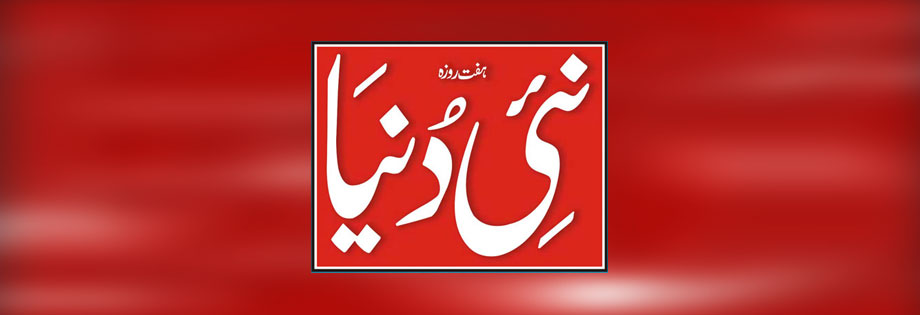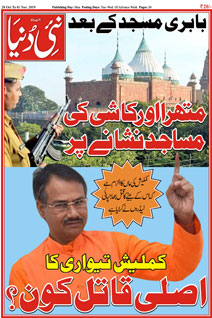Nai Duniya was launched by father of modern Urdu journalism in India Hazrat Maulana Abdul Waheed Siddiqui in 1951 from Ballimaran Delhi. Maulana Abdul Waheed Siddiqui is one of the pioneers of Urdu journalism in India. He launched his first Urdu paper Mohajir in 1914 from Dar-ul-Uloom Deoband. This was the first paper published from Deoband. Mohajir was a paper to support the war against British rule launched by Maulana Obaidullah Sindhi from Afghanistan .It was a qalmi jihad for the freedom of the mother land. Maulana went to British jails many times for his writings. Maulana, who was also popularly known as Mehbub-e-Millat, joined Zamindar’s editorial board to work with Maulana Zafar Ali Khan in Lahore. He was given the responsibility of restoring the publication of Al-Jamiat the daily newspaper of Jamiat Ul Ulama e Hind,Published from Delhi, once Maulana Maudidi the founder of Jamat-e-Islami resigned from the post of the editor of the paper.
After independence Maulana Abdul Waheed realized that there was a strong section of Congressmen who were not serious in making India a secular nation and give Muslims their due rights in the newly independent nation. He wrote against these duel policies of the Congress government. Jamiat which was supporting the Nehru government did not appreciate this and Maulana resigned from Al-Jamiat and launched Daily Nai Duniya in 1951.
The Congress government came down heavily on Nai Duniya from the first day. A British law to suppress freedom of speech was used to silence the voice of Nai Duniya. Maulana was asked to pay a security of 20000/ rupees. Firoze Gandhi, father of Rajiv Gandhi who was himself a journalist and a member of parliament raised his voice against this archaic law and a new law for the freedom of press was passed.
Daily Nai Duniya became the first voice of Indian Muslims in independent India. Maulana was prosecuted constantly. Government used every trick to suppress the voice of Nai Duniya. Maulana was in and out of jail for raising his voice against the atrocities being committed on Indian minorities. Govind Ballabh Pant ,the home minister of India at that time once told maulana that he considered Nai Duniya as the” enemy number 1” as it had given a new voice to the Muslim community whose tongue had been cut after partition of the country.
Maulana also used his pen to attack communal, fascist sangh elements both inside the congress and in the bureaucracy of the country. He launched a movement to bring Sikhs and Muslims closer in order to unite all the minorities. Nai Duniya supported the Punjabi Suba movement and won over the goodwill of the Sikhs who for nearly 250 years were ill disposed towards Muslims. This was not to the liking of the government and maulana was arrested on one pretext or the other. Dozens of false cases were initiated against him, but this soldier of conscience and truth, this fighter for justice and rights of the minorities refused to succumb to the pressures of the government. Ultimately Nai Duniya had to be closed down in 1963 under tremendous political, legal and economic pressure of the government. Maulana Abdul Waheed Siddiqui was ready to sacrifice himself and his newspaper but was not ready to surrender his freedom as a journalist and a fighter for justice and truth.
Maulana and his family had to go through tremendous hardships in the coming days but did not give up their struggle for the rights of the downtrodden in Indian. He brought about a revolution in Indian publishing industry by publishing Huma Urdu Digest in 1967. Huma became an overnight success. He launched Huda Islami Digest, Hadaf a tarikhi (Historic) digest,Adakaar a film magazine and then Taha first Islamic magazine in Hindi which is published till date.
In 1970 his youngest son Shahid Siddiqui launched Waqiat a fortnightly which was a pioneer in political and social magazine publication in India. In fact there was no such magazine even in English or Hindi on that pattern at that time. India Today which started publication in 1976 and Sunday in 1977 were on the pattern of Waqiat. However Urdu readership was not ready for such a professional investigative magazine and it closed down in 1973. Shahid Siddiqui under the guidance of his father Maulana Abdul Waheed Siddiqui decided to publish Nai Duniya as a political and social weekly. Nai Duniya within a few months of its launch created history and became the largest circulated weekly in India beating such established weeklies as Blitz and Nasheman.It brought about investigative ,bold ,honest and modern journalism to Urdu. It changed the idiom of Urdu journalism. It also helped in changing the attitude and brought secular, nationalistic, modern and democratic thinking to Indian Muslims who lapped up every issue of the paper. The weekly newspaper became such a craze that it used to sell within hours of its arrival on the stand.Nai Duniya definitely brought about a revolution in Urdu journalism and changed the attitude of Indian Muslims.
Since then Nai Duniya has been in the forefront of the struggle for the rights of Indian Minorities. When emergency was declared in 1975 Nai Duniya opposed it fearlessly and Maulana was arrested on 26th June 1975 at the age of 79 years. Nai duniya refused to surrender to the dictatorship and pre-censorship was imposed on it. When powerful and rich newspapers and publications were licking the feet of the government , Nai Duniya and its editors maulana Abdul Waheed Siddiqui and Shahid Siddiqui were standing tall.
Editors of Nai Duniya have been arrested under every black law in India from DIR,MISA to TADA but have never surrendered their rights as a journalist to tell the truth. Shahid Siddiqui was the first Indian journalist to be arrested under TADA in 1986 but was not only acquitted but became a symbol of fight against injustice and oppression. Nai Duniya is today the most popular Urdu weekly in the world. It is read in every country where Urdu knowing people reside. It is circulated all over gulf,Saaudi Arabia, UK,USA, Canada, Singapore and Malaysia. We rightly and proudly say ‘‘Duniya main Urdu hai jahan Nai Duniya hai wahan”(where ever in the world Urdu is known Nai Duniya is known).Nai Duniya was the first Urdu weekly in the country to use digital printing and as such brought about the modern digital revolution in printing in North India.
Editor: Shahid Siddiqui







